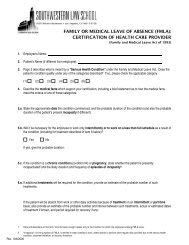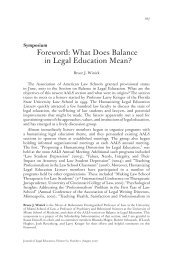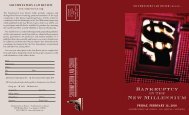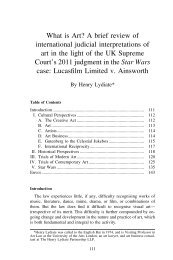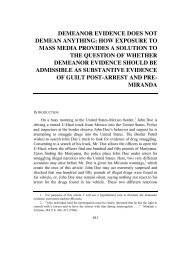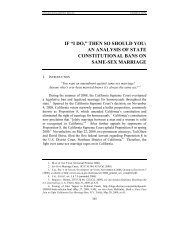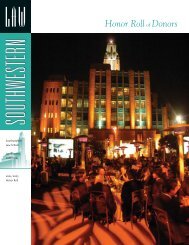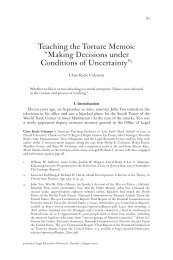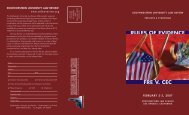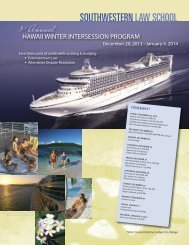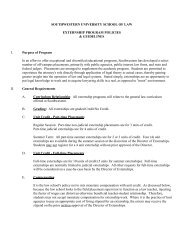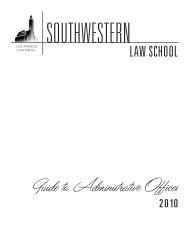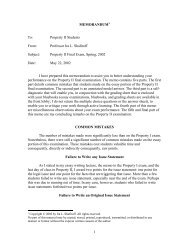An Autobiography of a Digital Idea - Southwestern Law School
An Autobiography of a Digital Idea - Southwestern Law School
An Autobiography of a Digital Idea - Southwestern Law School
Create successful ePaper yourself
Turn your PDF publications into a flip-book with our unique Google optimized e-Paper software.
<strong>An</strong> <strong>Autobiography</strong> <strong>of</strong> a <strong>Digital</strong> <strong>Idea</strong><br />
511<br />
on product and process; I will monitor the substance as well as the traffic to<br />
prevent misinformation and to ensure that all members contribute equally.<br />
The out-<strong>of</strong>-class blogging also should provide me with insight into students’<br />
thinking and learning to help me design lesson plans aimed at the right level<br />
during the semester.<br />
Wikis also can be useful in legal education. A wiki is a website that<br />
allows for simultaneous collaborative writing. A wiki is made up <strong>of</strong> multiple<br />
pages that include links and other interactivity created by many users. The<br />
most widely known wiki is Wikipedia 68 and digital students use others like<br />
wikitravel, 69 wikiHow 70 and WikiSummaries. 71 <strong>Law</strong> pr<strong>of</strong>essors can use wikis<br />
for collaborative writing in their courses to engage students in their learning.<br />
David Thomson, an innovative pr<strong>of</strong>essor at University <strong>of</strong> Denver, Sturm<br />
College <strong>of</strong> <strong>Law</strong>, used wikis in his administrative law class in two creative ways.<br />
First, he required his students to write a joint outline on a wiki; it was the<br />
only outline he permitted in his sit-down exam. He also created small group<br />
wikis for students to perform research on specific agencies. The result was<br />
student-generated, interactive, multi-media rich, collaborative documents that<br />
engaged and motivated his students to learn about administrative law. 72<br />
Wikis and blogs both are available now and can be used creatively and<br />
effectively in law school education. Creating public or password-protected<br />
wikis and blogs is easy and can be handled by research assistants, students, or<br />
by the pr<strong>of</strong>essor directly on a number <strong>of</strong> free websites. 73<br />
B. Immersive <strong>Digital</strong> Environments<br />
<strong>An</strong>other up and coming pedagogy I am pursuing is called “immersive digital<br />
environments.” 74 In this pedagogical approach, teachers engage students in<br />
an immersive world where they perform complex actions to achieve desired<br />
learning goals. As a result, students learn through performance and active<br />
discovery. 75 By totally immersing students in their familiar, computerized world,<br />
this approach “exploits the promise <strong>of</strong> emerging interactive technologies,<br />
meets students’ expectations for deep digital engagement, customizes the<br />
experience to each student’s unique needs, and promotes both long-term<br />
68. See wikipedia.com.<br />
69. See http://wikitravel.org/en/Main_Page.<br />
70. See http://www.wikihow.com/Main-Page.<br />
71. See http://wikisummaries.org/Main_Page.<br />
72. For more information on David Thomson’s use <strong>of</strong> wikis and other innovative ideas in legal<br />
education, see David I.C. Thomson, Legal Education for a <strong>Digital</strong> Age (LexisNexis 2009).<br />
73. See blogger.com and wordpress.com as well as wikispaces.com.<br />
74. Forman, supra note 13.<br />
75. See id.



